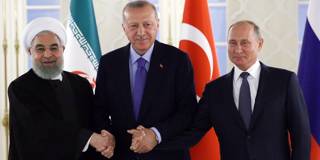With an economy the size of South Korea’s and military capabilities that are no match for America's, Russia lacks the tools required to act as an uncontested hegemon in the Middle East. When the United States decides to take up the mantle of democracy and peace again, Russia will be no match for it.
TEL AVIV – The collapse of the Soviet Union three decades ago meant that its once-formidable presence in the Middle East collapsed as well. Today, however, as the United States has withdrawn from the region, Russia has rushed to recapture the Soviet Union’s position there, through a combination of military force, arms deals, strategic partnerships, and the deployment of soft power. But its success is being significantly overestimated.

TEL AVIV – The collapse of the Soviet Union three decades ago meant that its once-formidable presence in the Middle East collapsed as well. Today, however, as the United States has withdrawn from the region, Russia has rushed to recapture the Soviet Union’s position there, through a combination of military force, arms deals, strategic partnerships, and the deployment of soft power. But its success is being significantly overestimated.